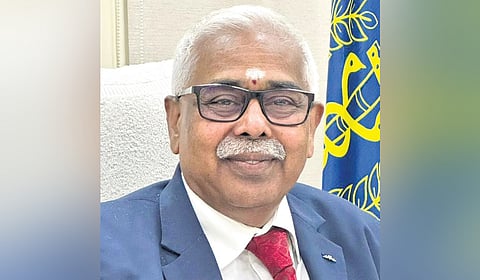

VIJAYAWADA: In connection with the linking of the State government’s implementation of the National Digital Health Mission (NDHM) with Clinical Establishment Act, the Indian Medical Association (IMA) raised concerns regarding the privacy, security, and safety of health records within the NDHM ecosystem in Andhra Pradesh. IMA national president Dr RV Asokan recently visited the State to discuss these issues with the IMA - AP members.
Expressing concern over potential misuse by private entities and foreign powers, Dr Asokan called for stringent data protection measures and sought State government’s clarification on mandatory data sharing under the Clinical Establishment Act. The IMA worries that inadequate data security measures may expose sensitive health information of the individuals to risks such as unauthorised access, data breaches, or misuse.
Highlighting the absence of appropriate laws regarding the data privacy and protection in India, IMA president Dr RV Asokan raised concerns about uploading detailed medical records to a centralised platform, questioning the State government’s objectives of interoperability and accessibility.
Speaking to TNIE, Dr RV Asokan highlighted issues with patient consent reliability, especially among vulnerable populations in State government hospitals. Criticising the term ‘Data Fiduciary,’ he argued against entities accessing patient data without safeguards and stressed the absence of a legal framework for the DHM, urging clear guidelines for data protection.
In connection with the issue, IMA-AP wrote a letter to the State government on March 21, 2024 about their concerns.
In response to the letter received from IMA with the subject quoting adoption of ABDM in Private Health Care Facilities (HCFs), the Director of Health and Family Welfare (HFW) addressed the IMA’s concerns over the National Digital Health Mission’s (NDHM) data privacy and security.
The HFW Director highlighted the robust measures in place, such as the Global Initiative on Digital Health (GIDH), led by WHO, the Digital Personal Data Protection Act, 2023 (DPDPA) to safeguard personal data, existing laws like the Information Technology Act, 2000, to provide legal recognition for electronic transactions.
Moreover, Ayushman Bharat Digital Mission (ABDM) guidelines ensure privacy through ‘Privacy by Design’ and federated digital architecture, with no centralised data repository and strict consent protocols, the Director added. The ABDM aims for a National Digital Health Ecosystem, offering citizens longitudinal Electronic Health Records. IMA’s involvement in the ABDM Advisory Committee underscores collaborative efforts. The Director reaffirms the Government of India’s commitment to a Digital Health India, urging support for NDHM and inviting private hospitals to join the ecosystem for its success.
However, speaking to this newspaper, the IMA president said that the response and the measures were not satisfactory. Dr Asokan further stated that they have written to the CEO of National Health Authority, seeking clarification over the legal basis for the adoption of ABDM in Private Health Care Facilities (HCFs) in Andhra Pradesh and asserted that the IMA is also weighing the option of filing a writ petition in the State High Court after receiving an official response from the CEO of NHA.
It may be recalled that the Ayushman Bharat Digital Mission (ABDM), a crucial component of the National Digital Health Mission (NDHM) launched in 2021, aims to establish an integrated online platform connecting patients and healthcare providers nationwide, enhancing transparency, efficiency, and overall patient outcomes. As of September 2022, Andhra Pradesh became the pioneer State in India by integrating over one crore electronic health records with the ABDM. The State also successfully generated more than 3.4 crore Ayushman Bharat Health Account (ABHA) numbers.
The cornerstone of ABDM’s efficacy lies in the seamless linkage of ABHA numbers with medical data, enabling patients to access their comprehensive health records from any location within the country without the need for physical documentation. As of January 24, 2024, a staggering 52,50,15,110 ABHA numbers have been issued nationwide, with Andhra Pradesh contributing significantly by generating 4,12,31,065 ABHA numbers, ranking third in India in terms of numbers generated.